Cracking the Spine on Casino Royale
 Wednesday, June 12, 2013 at 4:37PM
Wednesday, June 12, 2013 at 4:37PM I have a confession to make: I have only recently read a James Bond novel. Despite having loved the films for years, I only now decided to take a chance and check out what Ian Fleming did that started the whole phenomenon off sixty years ago. Thinking about it though, I imagine that most of the moviegoers that saw Skyfall never read a Fleming novel either. I’m probably not in the minority, so this probably isn’t a confession as much as a way to open this piece.
What is to be gained after watching all the movies in order and then reading your first Bond novel? Starting at the beginning, Casino Royale, gives the reader a different appreciation for the Bond character and for what Albert Broccoli and Harry Staltzman were trying to achieve in the films. And you get all this despite Fleming still being a “young,” amateurish author still trying to find his style at times.
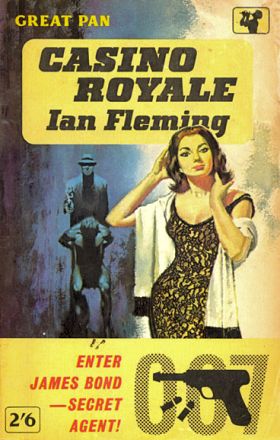 The character of Bond in the novel is very cold. The comedy that the Bond films are known for is entirely absent in the novels. I had heard this somewhere, so I wasn’t completely surprised, but what did surprise me was the level to which the character seemed to be void of emotion. The novel follows closely with the story of the film, so that in both Vesper is kidnapped by Le Chiffre. During the chase sequence in the novel, Bond considers Vesper as collateral damage if necessary. If anything happened to her, he’d simply go back to his hotel room and just go to sleep. In the morning, if anyone asked him what had happened, he had several lies prepared. In the film, we get the idea that he has already started falling in love with Vesper by that point. In the novel, this may be true, it may not be. It’s very unclear.
The character of Bond in the novel is very cold. The comedy that the Bond films are known for is entirely absent in the novels. I had heard this somewhere, so I wasn’t completely surprised, but what did surprise me was the level to which the character seemed to be void of emotion. The novel follows closely with the story of the film, so that in both Vesper is kidnapped by Le Chiffre. During the chase sequence in the novel, Bond considers Vesper as collateral damage if necessary. If anything happened to her, he’d simply go back to his hotel room and just go to sleep. In the morning, if anyone asked him what had happened, he had several lies prepared. In the film, we get the idea that he has already started falling in love with Vesper by that point. In the novel, this may be true, it may not be. It’s very unclear.
Bond’s muddled feelings lead me to another problem I had with Fleming’s novel – perhaps the biggest. The torture scene happens – slightly different from the film, but the pieces involved are the same – then Bond spends a while recovering in the hospital. Somewhere in that time, Bond has started falling in love with Vesper despite refusing to see her during his recovery. He doesn’t want to see her at first, then they start seeing each other, they end up at a little hotel outside the city to relax further and Bond is deeply in love at that point. He’s so love-struck that he even plans to propose to Vesper.
It could be said that this comes from his near-death torture experience, which does seem to have a profound impact on Bond to the point where he confides in Mathis his plans to leave the spy game. This speech is a bit heavy-handed. For a majority of the novel, Bond is always very brief in his speech. He’s straight to the point and not prone to soliloquy. (Think of the Bond we see in the movies, particularly Craig and Connery.) But suddenly we are “treated” to quite the dissertation on the nature of good men and evil men. This is where the novel falters for me. The speech does explain the effects that Le Chiffre had on Bond, and perhaps why he is so eager to run away with Vesper. In future novels, it may even be a recurring event that explains the actions Bond takes, but the writing just seems so out of place as the cold-hearted Bond suddenly becomes a philosophy major three-quarters into Casino Royale.
Don’t get me wrong, I enjoyed the novel immensely, but I think I was expecting a little more from the novel that started the character of James Bond. Its style was both a positive and hindrance. Fleming’s brief simple style was perfect for Bond’s brevity. Bond does not get caught up in unnecessary details. He focuses on what he needs, and so the reader is given exactly what they need. At the best moments, Fleming’s style is reminiscent of Hemingway in the depth mined from short, simple sentences.
At its worst, his style leaves out too much and makes hard transitions between scenes. Or in the aforementioned “good and evil” speech, becomes too overt with its point because Fleming was unable to find a better way to illustrate Bond’s psyche. I can’t help but wonder if some of this would have been cleared up had Fleming taken more than two months to write it.
The only other fault of the novel, which is less a fault of Fleming’s and more the fault of the modern world we live in and the ethnocentrism of Americans. Fleming being a well-cultured Brit familiar with most of Western European culture, drops in many culturally specific terms that I am unfamiliar with. Part of it is because these terms are outdated, but part of it was because I am unfamiliar with that part of the world to the level that Fleming is. It leaves me playing catch up at times and trying to deduce what he’s talking about based on context. It takes me slightly out of the novel, but that’s my own shortcoming for not being born closer to France, or taking French in high school. (I opted for Spanish.)
Thankfully, the most confusing part of Bond, is explained in understandable, detail. After reading the novel, I finally understand baccarat. Fleming provides a few pages of explanation and I suggest you read the book for fun, but also so you understand what’s going on in the early Bond films. There’s a lot to know, but the basics of it are similar to blackjack in that the goal is to get to 9. (After you learn the rules, you will see that this is an extremely basic explanation. I’m just trying to prove I read the book, so my tenth grade English teacher doesn’t start giving pop quizzes.) After knowing the basics of the game, the baccarat section of the novel reads as intense as the poker scene played in the film. It’s so good in fact that in his New York Times review, Anthony Boucher suggested ending the book after the game was over.
I went back and re-watched the first introduction to Bond on film in Dr. No. Bond’s game against Sylvia Trench is a lot more interesting than I ever realized and is a better introduction to the Bond character. It shows the luck Bond gets and his indifference towards it.
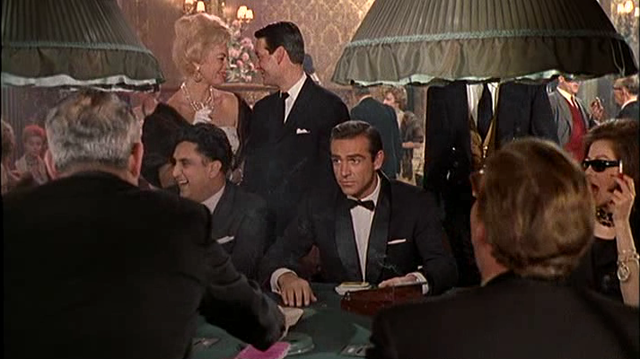 Won by luck. Cares less than guy next to him. #BondYOLO
Won by luck. Cares less than guy next to him. #BondYOLO
What did I learn from reading Casino Royale – my first Bond novel? Besides the rules of baccarat, I learned to appreciate the evolution of the character from print to film. Despite the growing pains of Ian Fleming’s style and voice, I see the gem that attracted Broccoli and Staltzman to James Bond. I’m looking forward to working my way through all the novels to see how James Bond continues to evolve along with Fleming’s writing. Next up, Live and Let Die. I can’t wait to check out Diamonds Are Forever and compare it with that film. I’m also looking forward to Dr. No. I hear there’s a giant squid in it.



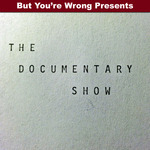
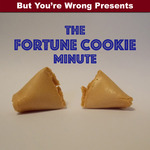
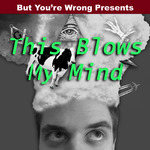
Reader Comments